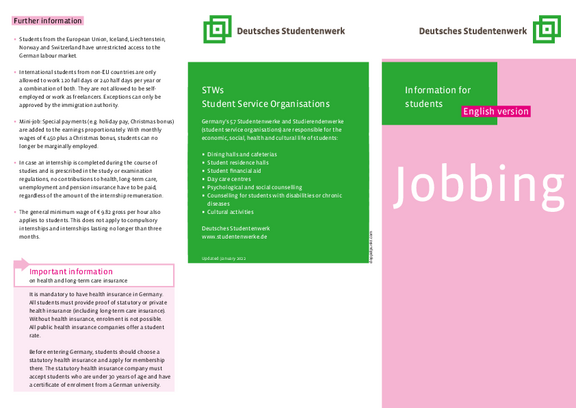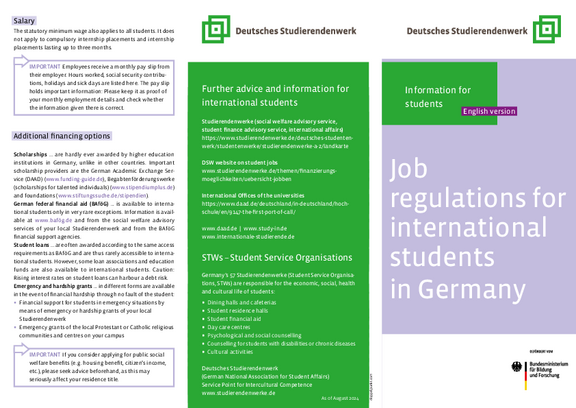Other financing options
Financing options
Studierende können zur Finanzierung ihrer Lebenshaltungskosten bzw. zur Überbrückung von Finanzierungslücken den flexiblen KfW-Studienkredit beantragen. Er steht sowohl BAföG-Empfänger*innen als auch Studierenden, die kein BAföG erhalten, zur Verfügung.
Weitere Informationen:
- Aktuelle Zins-Konditionen
- Umfassende Informationen zum KfW-Studienkredit
- Ansprech- und Vertriebspartner
TIPP: unsere Sozialberatung berät Sie gerne individuell dazu, ob der KfW-Studienkredit die richtige Lösung für Sie ist!
Die KfW-Bank spielt in der Bildungsfinanzierung eine wichtige Rolle: Im Auftrag des Bundes ist sie derzeit beim "verzinslichen Bankdarlehen im Rahmen des BAföG", beim "Bildungskreditprogramm des Bundes" und mit dem eigenen "KfW-Studienkredit" aktiv.
Auch private Kreditinstitute bieten eigene Kredite speziell für Studierende an.
Eine Übersicht finden Sie auf der Seite von studis-online.
Der Bildungskredit ist zeitlich befristet und zinsgünstig und steht sowohl BAföG-Empfänger*innen als auch Studierenden, die kein BAföG erhalten, zur Verfügung.
Voraussetzungen für den Bildungskredit:
- für Studierende in fortgeschrittenen Ausbildungsphasen (nach bestandener Zwischenprüfung oder gleichwertiges, also nicht für Studierende im Grundstudium), bei einem Bachelor-Studiengang reicht der Nachweis, dass die üblichen Leistungen des ersten Ausbildungsjahres erbracht wurden;
- das 36. Lebensjahr darf noch nicht überschritten sein;
- grundsätzlich nur bis zum Ende des 12. Studiensemesters.
The graduation loan (in Bavaria)
The Darlehenskasse der Bayerischen Studierendenwerke e. V. aims to make it easier for needy students at Bavarian universities to prepare for their exams and successfully complete their studies by granting graduation loans. Further information: Bavarian Loan Fund
The most important facts in a nutshell:
- Interest-free for up to 5 years, then only 2 percent interest per year
- Up to €700 per month and up to €18,000 in total
- Up to €3,000 possible without a security deposit
Independent and individual advice and application at the Studierendenwerk Würzburg
CHE-Studienkredit-Test 2024
Here you can find the current CHE student loan test (German PDF file) with a comparison of student loans, graduation loans and education funds
Eine weitere Möglichkeit das Studium zu finanzieren, bieten die Stipendien der Begabtenförderungswerke und sonstiger Stiftungen von öffentlichen Trägern, konfessioneller und privater Stiftungen und von Wirtschaftsunternehmen.
Zu den 13 großen Begabtenförderungswerken zählen sechs politische Stiftungen, drei konfessionelle Träger, die Förderungswerke des Deutschen Gewerkschaftsbundes und der Deutschen Wirtschaft sowie die Studienstiftung des deutschen Volkes.
Als erste Ansprechpartner*innen können Sie sich an die zuständigen Vertrauensdozierenden der Hochschulen wenden. Sie sind auch bequem über das Internet zu erreichen:
University of Würzburg: https://www.uni-wuerzburg.de/studium/finanzierung/stipendien-finden/
TH Würzburg/Schweinfurt: https://www.thws.de/beratung-und-service/stipendien/
Hochschule für Musik Würzburg: https://hfm-wuerzburg.de/studium/stipendien
Selection of funding and scholarships:
Mit dem nationale Stipendienprogramm „Deutschland-Stipendium“ können besonders begabte und leistungsstarke Studierende mit 300,– € pro Monat gefördert werden. Die Hälfte davon übernimmt der Bund, die andere Hälfte wird von der Hochschule bei Unternehmen, Stiftungen oder Privatpersonen eingeworben.
Detaillierte Infos unter: http://www.deutschland-stipendium.de
Die Hochschulen übernehmen die zentrale Vermittlerrolle beim Deutschlandstipendium. Bei Interesse informieren Sie sich an Ihrer Hochschule.
Es handelt sich hierbei um eine einmalige Beihilfe zur Beschaffung von Büchern oder sonstigen Lernmitteln. Alternativ kann ein Zuschuss zu den Druckkosten von Dissertationen gewährt werden. Die Bedürftigkeit wird ohne weitere Prüfung dann anerkannt, wenn BAföG bezogen wird.
Bei Interesse wenden Sie sich an Ihre Hochschule.
Tel.: (0228) 81 63-0, Internet: www.obs-ev.de
Tel.: (089) 21 88 90 80, Internet: www.eliteakademie.de
Diese Förderung des Bundes richtet sich an Fachkräfte mit einer Ausbildung und mind. zwei Jahren Berufspraxis, Internet: www.aufstiegsstipendium.de
Tel.: (0931) 35 03- 101, Internet: Stiftung Bürgerspital zum Hl. Geist
Further information on the subject of scholarships
- Weitere Infos im Internet unter: www.stipendiumplus.de
- www.mystipendium.de
Diese umfangreiche Stipendienplattform mit mehr als 2.000 Stipendienprogrammen
gibt es online unter www.mystipendium.de - ELTERNKOMPASS
Ein Informationsangebot für Eltern zu allen Fragen rund um das Thema „Ein Stipendium für mein Kind?!“ als Service-Angebot der Stiftung der Deutschen Wirtschaft.
Service-Hotline ELTERNKOMPASS: Tel.: (030) 27 89 06-777
E-Mail: service(at)elternkompass(dot)info, Internet: http://www.studienkompass.de/elternkompass.html - Stipendien-Datenbank von „e-fellows.net“
Eine weitere ausgezeichnete Informationsquelle stellt die Stipendien-Datenbank des Karrierenetzwerkes e-fellows.net mit über 700 Förderprogrammen von mehr als 400 Institutionen dar. Weitere Details online unter: www.e-fellows.net - ApplicAid - Application to success
ApplicAid ist eine gemeinnützige Organisation, die Menschen aus bildungsbenachteiligten Gruppen über Stipendien informiert und bei Bewerbungen unterstützt. Weitere Informationen unter: www.applicaid.org
Parents are generally obliged to support their children until they obtain their first professional qualification. Students may therefore also be entitled to maintenance.
You can find information on maintenance entitlement during your studies here:
https://www.studierendenwerke.de/themen/finanzierungsmoeglichkeiten/unterhalt-der-eltern
https://www.studis-online.de/studienfinanzierung/unterhalt.php
Or you can get individual advice from the social counseling service of the Studierendenwerk.
Child allowance is paid to anyone who is resident in Germany. International students can receive child benefit for their children if they have a valid settlement or residence permit (only certain types).
Child allowance is generally paid until the child reaches the age of 25 at the latest.
The current monthly child benefit amount can be found on the Studis-online website.
Child allowance is paid from the beginning of the month in which the eligibility requirements are met and until the end of the month in which the eligibility requirements cease to apply.
Detailed information (amount, requirements, etc.) on child benefit during studies can be found on the Studis-online website.
The written application must be submitted to the relevant family benefits office of the employment agency where the applicant is resident.
Free service hotlines for child allowance:
Tel.: (0800) 4 55 55 30 (Information)
und (0800) 4 55 55 33 (Payment dates for child allowance)
Internet: www.arbeitsagentur.de (Information on child allowance from 18)
Who is entitled to housing allowance?
e.g. students who
- have exceeded the age limit of 30 years at the beginning of their studies,
- have changed their education or field of study without a recognized reason,
- have exceeded the maximum funding period,
- are not eligible for BAföG as international students,
- have started a course that is not eligible for funding (e.g. second course),
- have not provided the required proof of performance according to § 48 BAföG
Further information
The application for housing allowance must be submitted to the responsible housing allowance office and will be paid from the month in which the application is submitted. The application must be accompanied by the following
- Notification from the BAföG office that you are entitled to BAföG on the merits, but are not entitled to BAföG for reasons of point 1. or 2.
- Certificate from the landlord/landlady stating the rent, size and first occupancy of the apartment,
- Proof of income (parents, income, loan, etc.),
- Proof of health insurance,
- Certificate of enrollment.
The Housing Office will issue a written decision on any housing allowance, which you can appeal against within four weeks if necessary. If the decision is positive, housing allowance is usually paid for 12 months. After 10 months, a new application should be submitted.
All information on housing allowances and the current housing allowance tables can be found on the website of the Federal Ministry of the Interior, Building and Community.
Links to the housing allowance offices:
The Studierendenwerk Würzburg provides free meal vouchers (so-called Freitischmarken) to students in need.
- Students who are experiencing temporary hardship through no fault of their own can receive these vouchers.
- They can receive 20 vouchers per semester for up to two semesters.
- Students who would like to receive the vouchers must request them in person at the offices of the social counselling service.
- The vouchers are provided by the Studierendenwerk on a voluntary basis. Students have no legal entitlement to them.
If you want to request free meal vouchers, you must hand in the following documents:
- the completed and signed request form; please download and print out the pdf file
- a copy of your current certificate of matriculation (Immatrikulationsbescheinigung)

